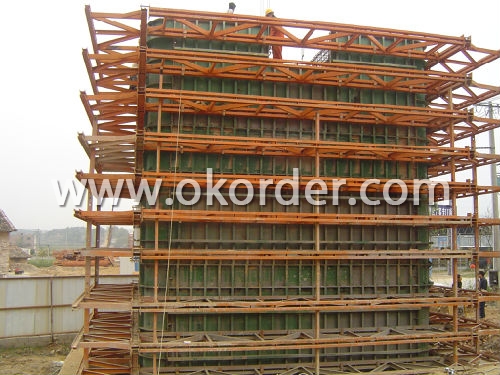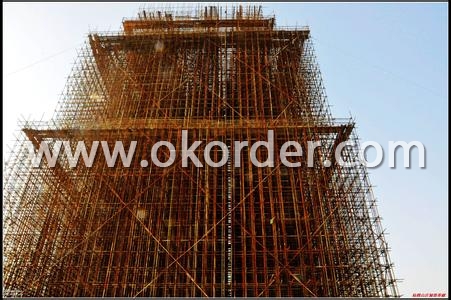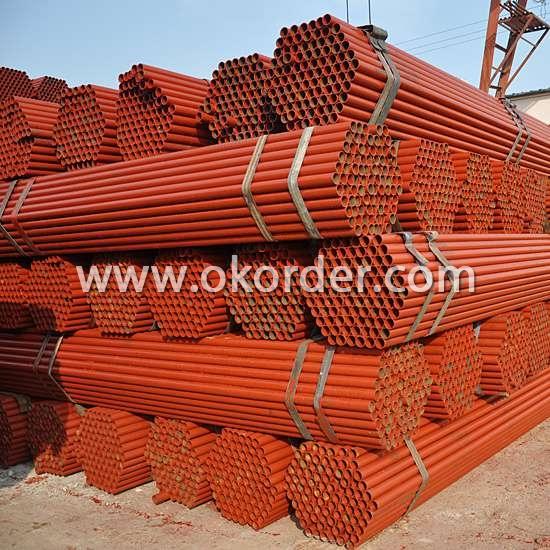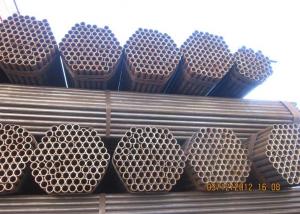Construction Scaffolding Pipe
- Loading Port:
- China Main Port
- Payment Terms:
- TT or LC
- Min Order Qty:
- 50 Tons m.t.
- Supply Capability:
- 5000 Tons Per Month m.t./month
OKorder Service Pledge
OKorder Financial Service
You Might Also Like
Quick Details of Construction Scaffolding
1.Thickness: 2-4mm 2.outer diamiter: 35~60mm 3.materials:Q235/Q255/Q345
4.Surface:hot dip galvanized,painted galvanized.
the chemical composition of raw materials | the mechanical property of raw materials | ||||||||||
item | Chemical composition % | Item | mechanical property | ||||||||
steel | steel number | C | Mn | S | P | Si | Al | steel | yield point Mpa min | tensile strength Mpa | elongation % min |
S235GT | 1.0106 | < 0.20 | < 1.40 | < 0.045 | < 0.040 | < 0.05 | > 0.020 | S235GT | 235 | 340--520 | 24 |
Standard: BS EN39 Loose steel tubes for tube and coupler scaffolds -- Technical delivery conditions | |||||||||||
other material: A500 A, B, C , D. A53 A, B. S275, S355, C250, C350 | |||||||||||
1) surface treatment: galvanized , oiled, painted , bare | |||||||||||
2) end treatment: beveled , plain , threaded | |||||||||||
3) test:chemical component analysis, mechanical properties ,technical properties , exterior size inspection | |||||||||||
4)application: fence. Construction. | |||||||||||
5)certificate: SGS inspection | |||||||||||
6)delivery time: usually in 20--30 days | |||||||||||
7) payment term: T/T , L/C, Western Union | |||||||||||
Application of Construction Scaffolding

Application of Construction Scaffolding

Packing of Construction Scaffolding

- Q:How are steel pipes protected against mechanical damage?
- Steel pipes are protected against mechanical damage through various methods such as applying coatings, using protective sleeves or wraps, implementing proper handling techniques, and employing impact-resistant materials in high-risk areas.
- Q:How are steel pipes used in the manufacturing of furniture and appliances?
- Due to their strength, durability, and versatility, steel pipes find widespread use in the production of furniture and appliances. In furniture manufacturing, they are commonly employed to construct the frames and structures of various pieces, including chairs, tables, and beds. Serving as the primary support system, these pipes ensure a sturdy and dependable foundation for the furniture. In appliances, steel pipes serve multiple purposes. They are frequently utilized to create the internal framework and bear the weight of kitchen appliances such as stoves, ovens, and refrigerators. Additionally, steel pipes are commonly found in washing machines, dryers, and dishwashers, facilitating the transportation of water and other fluids throughout the appliance. Moreover, steel pipes are essential in the manufacture of outdoor furniture and equipment that require weather resistance and durability. To safeguard against rust and corrosion, these pipes are often coated with protective materials, thus ensuring the longevity of the furniture and appliances. In conclusion, steel pipes play a vital role in the production of furniture and appliances, providing the necessary strength and support. Their versatility allows for various applications, making them an indispensable component in the manufacturing process of these goods.
- Q:What are the factors affecting the pressure rating of steel pipes?
- The factors affecting the pressure rating of steel pipes include the material of the pipe, its thickness, diameter, and quality, as well as the temperature and type of fluid being transported. Additionally, the operating conditions, such as the level of stress or strain on the pipe, also play a significant role in determining its pressure rating.
- Q:How do you calculate the pipe flow velocity coefficient for steel pipes?
- The Manning's equation is employed to determine the flow velocity in open channels and pipes, taking into consideration the hydraulic radius, slope, and roughness coefficient of the pipe. By applying this equation, the pipe flow velocity coefficient for steel pipes can be calculated. To ascertain the pipe flow velocity coefficient for steel pipes, the following steps should be followed: 1. Calculate the hydraulic radius (R) of the steel pipe by dividing the cross-sectional area (A) of the pipe by the wetted perimeter (P). The formula to use is R = A/P. 2. Determine the slope (S) of the pipe, which is the change in elevation divided by the length of the pipe. Usually, it is expressed as a ratio or a percentage. 3. Obtain the roughness coefficient (n) of the steel pipe, representing the internal roughness of the pipe. This information can be found in literature or pipe manufacturer specifications, often given in terms of the Manning's roughness coefficient. 4. Insert the values of hydraulic radius (R), slope (S), and roughness coefficient (n) into the Manning's equation: V = (1/n) * R^(2/3) * S^(1/2) where V signifies the flow velocity. 5. Solve the equation for V to calculate the pipe flow velocity coefficient for steel pipes. It is crucial to note that the calculated velocity coefficient may differ depending on specific pipe dimensions, flow conditions, and other factors. Therefore, it is advisable to consult relevant engineering standards or seek guidance from a hydraulic engineer to ensure accurate and reliable calculations for specific applications.
- Q:Can steel pipes be used for transporting drinking water?
- Yes, steel pipes can be used for transporting drinking water. Steel pipes are commonly used in water distribution systems and have been used for many years. They are known for their durability, strength, and resistance to corrosion. However, it is important to ensure that the steel pipes used for transporting drinking water are properly coated or lined to prevent any potential contamination from the metal. Additionally, regular inspections and maintenance should be carried out to ensure the integrity of the pipes and to prevent any leaks or breaks that could compromise the quality of the water.
- Q:What is the outer diameter and wall thickness of the welded steel pipe of national standard DN250?
- DN250 is the nominal diameter, the outer diameter of the steel pipe is 273mm, the thickness is above 6.5mm.
- Q:How do steel pipes handle seismic expansion joints?
- Steel pipes handle seismic expansion joints by allowing for movement and flexibility. These pipes are designed to withstand the forces caused by seismic activity, such as earthquakes, by accommodating expansion and contraction without causing damage to the overall structure. The joints in steel pipes are often equipped with specialized components, such as bellows or flexible couplings, that can absorb the movement and prevent excessive stress on the pipeline. This ensures the integrity and safety of the pipeline system during seismic events.
- Q:How are steel pipes graded?
- The quality and suitability of steel pipes are determined by grading them based on several factors. The grading system typically takes into account parameters such as the chemical composition, mechanical properties, manufacturing method, and testing standards. 1. When it comes to the chemical composition, steel pipes are graded according to the elements present in their composition. This includes the quantities of carbon, manganese, phosphorus, sulfur, and other alloying elements. The pipe's strength, corrosion resistance, and other properties are greatly influenced by its chemical composition. 2. The mechanical properties of steel pipes play a crucial role in determining their strength, flexibility, and resistance to pressure and temperature. These properties encompass tensile strength, yield strength, elongation, hardness, and impact toughness. Pipes with higher mechanical properties are generally given higher grades. 3. The manufacturing method used for steel pipes can vary, with options such as seamless, welded, or ERW (Electric Resistance Welding). The manufacturing method has an impact on the pipe's integrity, dimensional accuracy, and overall quality. For example, seamless pipes are considered to be of higher quality due to their uniformity and lack of weld seams. 4. Steel pipes are graded based on their adherence to specific testing standards. These standards ensure that the pipes meet the required quality criteria and are suitable for their intended applications. Common testing standards include ASTM (American Society for Testing and Materials), API (American Petroleum Institute), and EN (European Norms). Taking these factors into consideration, steel pipes are often assigned alphanumeric codes or specifications for grading. For instance, pipes used in the oil and gas industry may be graded as API 5L (American Petroleum Institute), while pipes used for structural purposes may be graded as ASTM A500 (American Society for Testing and Materials). In conclusion, the grading of steel pipes is determined by their chemical composition, mechanical properties, manufacturing method, and adherence to testing standards. These grades assist customers and manufacturers in selecting the appropriate pipes for specific applications, ensuring safety, durability, and efficiency across various industries.
- Q:How are steel pipes used in the food and beverage industry?
- Steel pipes are commonly used in the food and beverage industry for various applications such as transporting liquids and gases, including water, beverages, and food ingredients. They are chosen for their durability, resistance to corrosion, and ability to maintain hygiene standards. Steel pipes are used to facilitate the flow of materials throughout the production process, ensuring safe and efficient operations in the food and beverage industry.
- Q:Are steel pipes suitable for underground industrial waste disposal?
- Steel pipes are often used for underground industrial waste disposal due to their durability and strength. They have the ability to withstand the harsh conditions underground, including moisture, pressure, and corrosion. Additionally, steel pipes are resistant to chemical reactions, making them suitable for handling various types of industrial waste. They can effectively transport and contain hazardous materials, ensuring the safety and protection of the environment and surrounding areas. Overall, steel pipes are considered a reliable and efficient option for underground industrial waste disposal.
1. Manufacturer Overview |
|
|---|---|
| Location | Hebei,China |
| Year Established | 2005 |
| Annual Output Value | Above 100 Million RMB |
| Main Markets | Main land;Middle East;Southeast Asia |
| Company Certifications | ISO9001 |
2. Manufacturer Certificates |
|
|---|---|
| a) Certification Name | |
| Range | |
| Reference | |
| Validity Period | |
3. Manufacturer Capability |
|
|---|---|
| a)Trade Capacity | |
| Nearest Port | Tianjin;Qingdao |
| Export Percentage | 41% - 50% |
| No.of Employees in Trade Department | |
| Language Spoken: | English;Chinese;Korean |
| b)Factory Information | |
| Factory Size: | 120mu |
| No. of Production Lines | 11 |
| Contract Manufacturing | OEM Service Offered;Design Service Offered |
| Product Price Range | High Average |
Send your message to us
Construction Scaffolding Pipe
- Loading Port:
- China Main Port
- Payment Terms:
- TT or LC
- Min Order Qty:
- 50 Tons m.t.
- Supply Capability:
- 5000 Tons Per Month m.t./month
OKorder Service Pledge
OKorder Financial Service
Similar products
New products
Hot products
Related keywords






























